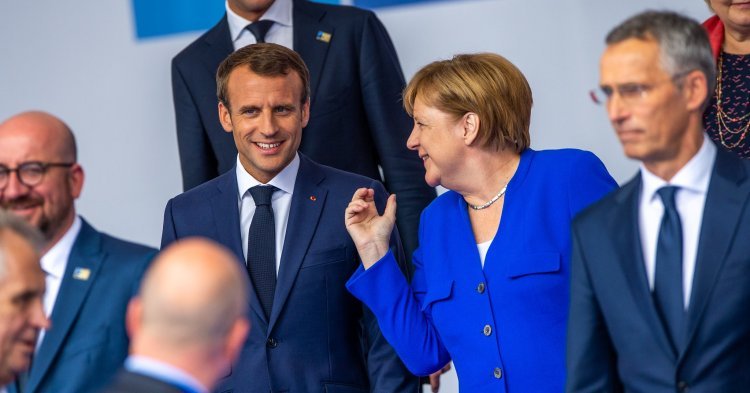
Jérôme Flury and Théo Boucart for Le Taurillon: A landmark victory on the European front for President Macron?
 The European Commission’s announcement of a €750 billion plan (“Next Generation EU”) as a spur for the European economy in the aftermath of the COVID-19 pandemic is a historical step towards a more efficient Union - especially when comparing to the paucity of the bloc’s response following the 2007-08 financial crisis. The structure of this recovery plan, including 500 billion euros in grants towards the most affected regions, would be a major improvement in terms of solidarity within the EU.
The European Commission’s announcement of a €750 billion plan (“Next Generation EU”) as a spur for the European economy in the aftermath of the COVID-19 pandemic is a historical step towards a more efficient Union - especially when comparing to the paucity of the bloc’s response following the 2007-08 financial crisis. The structure of this recovery plan, including 500 billion euros in grants towards the most affected regions, would be a major improvement in terms of solidarity within the EU.
This proposal of a recovery plan seems a double victory for President Macron. First, since his election in 2017, he has always advocated for more budgetary solidarity among the member states, notably through a proper Eurozone budget and debt mutualization. Until now, Germany had always refused to discuss the idea of a “transfer union”, but the Franco-German initiative announced on May 18th represented a major U-turn from the German Chancellor, as she officially endorsed both temporary debt mutualization and budget transfers to help European countries. Second, the Commission’s proposal largely embraces this Franco-German initiative both in terms of the amount of money and the allocation method. Deeply unpopular in his own country, Emmanuel Macron may be able now to point to his European successes in the public sphere. Nevertheless, few media outlets, let alone the TV networks, have reported the news, except the national newspaper Libération, which published an iconic front page on Thursday 28th May.
France would be also one of the major beneficiaries of the recovery plan, receiving almost 40 billion euros in grants. Although this allocation only represents 1.5% of the country’s GDP, these funds could help finance energy and digital transitions in France (the country is lagging increasingly behind other European countries). France is among the member states with the greatest potential with regard to the production of renewable energy. The recovery plan could therefore attract private investment in sectors with great added value.

Xesc Mainzer for El Europeísta: A lifeboat that might not do much against euroscepticism
The announcement of the €750bn “Next Generation EU” COVID-19 recovery fund came as a relief to those who witnessed, with a mix of disappointment and dismay how member states quarreled with each other on the issuance of the so-called ‘coronabonds’ a few months ago. According to the European Commission, Spain could receive as much as €140bn from the fund, being second only to Italy. The arrival of such a large amount of financial support (equivalent to 11.6% Spanish GDP in 2018) will be crucial to rescue Spain’s service-oriented economy which has been severely hit by this pandemic. However, the prospect of conditionality being imposed may deliver - yet another - blow to the EU’s popularity in Spain.
This comes a few days after an agreement was achieved in the Spanish parliament to repeal the highly unpopular labour reform of 2012, implemented within the framework of hard economic reform in the wake of the financial crisis. With the announcement of the recovery plan and the possibility of imposing the condition of structural reform, rumours started circulating regarding the possibility of keeping the 2012 labour reform untouched as a condition to access recovery funding. This, of course, turned what could have been a way for citizens to regain trust in European institutions into just another example of what many see as “Brussels-imposed cuts in social rights”.
Attaching conditions such as economic reforms to the launch of a financial lifeboat to save economies hardest hit by an unforeseen catastrophe such as this to the implementation of certain economic reforms seems morally questionable - to say the least. It is also careless given that it may come at the cost of boosting anti-EU sentiments.

Paolo Di Fonzo for Eurobull: Italy needs for European support, beyond the economy
Due to a mix of unfortunate circumstances, terrible management of public healthcare in the past decades and even worse crisis management, Italy has found itself buried deep, with losses that hit both the population and the economy hard. At the height of the crisis, President von der Leyen’s public declaration only fuelled the antagonism for the EU and other Member States among Italian citizens, in a country that has been veering towards euro-scepticism and extreme right for many years. What has been said and done since then by the Commission, however, has been helping to rebuild the trust Italy has in the EU as a whole, with the current proposal being the most important step in that direction.
Italy being the country that would receive the biggest part of the grants is sending a clear signal, both to the general population and to the financial markets, always ready to prey upon the ever-degrading Italian public debt. On the political side, many will use this chance to present this as a move by Germany and France to take control of Italian sovereignty, as it has been done in the past when Italy was forced to restructure its public spending in order to contain the growth of its massive debt. Decades of eroding trust in the European institutions and the general frustration due to the crisis will certainly give those supporting such a thesis many followers.
The bright side is however that an appropriate handling of the funds at the national and local levels could instead create that sense of appreciation for the mutual support offered by other Member States at the worst of times, a return to the original spirit upon which the first European Communities were funded. This brings forth the overarching question, that will determine both the future of the Italian economy and the country’s status within European institutions: will the usually short-sighted and unstable Italian government be able to make appropriate use of the European grants? The future of Italy’s economy and its ability to stay in the EU hinge on the answer.

Madelaine Pitt for The New Federalist: No rescue without representation
Well, one country that won’t be benefitting from the EU’s recovery fund is the United Kingdom. The nation remains bound by all European law until the end of the transition period, currently set for 31st December 2020 (although it has to be said the UK does not have a good track record in meeting such deadlines). However, the €750 billion boost endorsed by Commission President Ursula von der Leyen is set to kick in in 2021, and, already considered as a non-member state, the UK has no right to benefit from it.
There is also no question that the UK will contribute to funding the EU’s recovery package, unless the transition period is extended many times due to perpetually failing negotiations (we can but hope). The withdrawal agreement dictates that the UK will pay its fair share of commitments and liabilities until the end of the transition period, but the next Multiannual Financial Framework or European budget should come into play at the beginning of the new year after it finishes; and anyway, in the terms laid out in Next Generation EU, no significant increase is planned. As the package will be paid back in future budgets, the UK would, as the bloc’s second-biggest contributor, have picked up a sizeable amount of the bill.
Despite being outside the Eurozone, the UK’s decidedly more neoliberal mindset would have made it a friend of the frugal coalition on this occasion. The issue of joint European debt, even on a short-term basis, would have been an unthinkable proposal to agree to for the Conservative government. Whenever questions of moral hazard have arisen in the past, for example in discussions on banking regulation and supervision, the UK preferred to keep its distance. In this sense, it is useful that the European Commission does not, this time around, have to reckon with dissenting British voices and a possible veto in the Council. If the plan is agreed, it will be a great step forward in European solidarity. If Britain were still a member, it would have been doomed from the outset.

Martin Müller for Treffpunkteuropa: Mere pragmatism or a Hamiltonian moment?
On Monday 18th May, Angela Merkel surprised the European stage as well as the national audience by proposing an unexpected Franco-German response to the economic damage caused by the COVID-19 pandemic. In what seemed like a U-turn on the government’s previously rather hawkish position in the Union’s budgetary quarrels, she signalled openness for both budget transfers and temporary large-scale EU borrowing. In the past, these demands, more than often articulated by Southern member states, were brushed aside by Berlin’s EU diplomats. As this is apparently no longer the case, the proposal by Emmanuel Macron and Mrs Merkel paved the way for the EU Commission’s “Next Generation EU” fund, announced by Ursula von der Leyen on 27th May.
In the public sphere, the recovery plan, resembling the Franco-German initiative in both structure and scale, is widely supported. The general positive tone can be attributed to the fact that both proposals do not include debt mutualization in a coronabonds sense, avoiding the possibility of a single member state guaranteeing all of the EU’s borrowing. Despite the skepticism of some conservative voices, who oppose the concept of budget transfers and who are doubtful about the enforceability of their conditionality, there appears to be a broad consensus on the appropriateness of the fund. The allocation method as well as the massive size of the stimulus seem to match the challenges the Union is facing.
Interpreting Mrs Merkel’s change in mindset as driven by mere European solidarity is, however, misleading. With more than half its exports traded to other parts of the EU, the country cannot bear the costs of a threatened single market. If the European economy goes down the drain, so does Germany’s – which is why it is in the government’s own interest to help its highly indebted neighbours cope with the economic aftermath of the pandemic. Considering the political calculations and the pragmatic concessions made on both sides, the recovery fund looks to many more like the usual political haggling between the Union’s heads of state and government than like a giant leap towards greater European integration.

Jakub Stefaniak for Kurier Europejski: a winning budget
After a series of negotiations and proposals from different European countries, the Commission has presented its recovery plan, which doubles as the multiannual financial framework for the period 2021-2027. This framework, supplemented by a €750 billion fund, is the most important budget in the EU’s history. Although this plan is only a proposal for the moment, the Polish government has already celebrated its success with the measures presented by the Commission. Prime Minster Morawiecki stated: “It’s the proof that Poland’s voice counts in Europe, we are heard and valued.”. In his speech, the Prime Minister also emphasised the support of the President Andrzej Duda, and thanked him for his “laborious late-night talks”. However, is it too early to call this a success?
Poland is expected to be one of the biggest recipients of the budget proposed by the Commission — it would receive €63.8 billion. However all this is only a proposal — this budget will then be negotiated in the European Council, where Poland will only be represented by its Prime Minister. We should also keep in mind that an unofficial presidential campaign is underway in Poland, and that this budget proposal is such an opportunity for Andrzej Duda that it would be a shame for him to not use it for his campaign.
The EU budget proposal is indeed very good for Poland, but the devil is in the details. The European Council must discuss this recovery plan and make sure access to recovery funds will subject to the rule of law. This means that the Commission could refuse the payment of funds to a country if it considers that the rule of law has been violated there. Additionally, the European Commission wants the loans (€250 billion from cohesion funds) to be paid back on the basis of new clean fuels, for example the carbon tax at EU borders, to which Poland remains opposed. It will be at the next European summit that we will discover the outcome of the budget negotiations. If the result isn’t good enough for Poland, it can always blame the EU, as it has already done in the past.









Follow the comments: |
|
